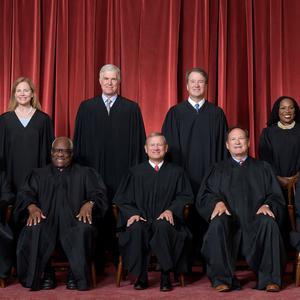
Executions in Arizona are effectively on hold after Governor Katie Hobbs (pictured) ordered a review of the state’s execution process following three botched executions in 2022 and Attorney General Kris Mayes filed a motion to withdraw the state’s only pending request for a death warrant. The two state officials, elected in the November midterm elections against opponents who falsely claimed the 2020 Presidential election had been stolen, said their actions will help ensure transparency and accountability in the state’s use of the death penalty.
In an executive order issued on January 20, 2023, Governor Hobbs said she would be appointing a Death Penalty Independent Review Commissioner “to review and provide transparency into the [Arizona Department of Correction, Rehabilitation & Reentry’s (ADCRR)] lethal injection drug and gas chamber chemical procurement process, execution protocols, and staffing considerations.”
Arizona resumed executions in 2022 after an eight-year hiatus. The July 23, 2014 execution of Joseph Wood was botched, taking nearly two hours, with witnesses reporting that Wood gasped and snorted more than 600 times. As Arizona officials attempt to restart executions, they spent $1.5 million to obtain lethal injection drugs, even as ADCRR was being held in contempt by a federal judge for failing to redress inhumane prison conditions and to provide basic nutritional needs to prisoners in solitary confinement. ADCRR also refurbished its gas chamber and spent more than $2,000 to acquire ingredients to execute prisoners with cyanide gas, the same gas used by the Nazis to murder more than one million men, women, and children during the Holocaust. After replacing the seals and gaskets of the 70-year-old gas chamber, corrections staff then tested the chamber for airtightness by passing the flame of a candle slowly near the seals of the chamber.
In April 2021, then-Attorney General Mark Brnovich sought death warrants to execute Clarence Dixon and Frank Atwood and urged the Arizona Supreme Court to set expedited filing deadlines so the courts could review the prisoners’ challenges to Arizona’s lethal-injection protocol in what he falsely claimed was a 90-day window before the drugs ADCRR had purchased went bad. After learning that the drugs would actually expire in 45 days, the court rejected the motion. Death warrants were subsequently issued for three prisoners in 2022, but ADCRR botched all three. Reporters and defense attorneys criticized the state’s secrecy policies for contributing to the problems in the executions of Clarence Dixon, Frank Atwood, and Murray Hopper.
The governor’s executive order noted that “Arizona has a history of executions that have resulted in serious questions about ADCRR’s execution protocols and lack of transparency” and that “a comprehensive and independent review” was necessary “to ensure these problems are not repeated in future executions.”
Hobbs’ order requires that the Independent Review Commissioner “shall not be currently or previously employed with the ADCRR and shall have experience with death penalty or lethal injection issues.” “With the Arizona Department of Corrections, Rehabilitation and Reentry now under new leadership,” she said, “it’s time to address the fact that this is a system that needs better oversight on numerous fronts.”
Attorney General Kris Mayes applauded Hobbs for ordering the appointment of a independent commissioner. “If Arizona is going to execute individuals, it should have a system for doing so that is transparent, accountable, and carried out in a manner faithful to our constitution and the rule of law,” Mayes said. “I look forward to working with the governor, the newly established commissioner, and others to ensure the public’s confidence in Arizona’s capital punishment system.”
Mayes said she will not seek execution dates while the new commissioner is reviewing the state’s death penalty process and filed a motion in the Arizona Supreme Court to withdraw a motion filed by her predecessor to set an execution date for Aaron Gunches. In the motion she wrote that prosecutors had sought an execution date after Gunches had asked to be executed and Gunches, after learning of the state’s botched executions had asked the withdraw his request. “[B]ecause a thorough examination of the administration of capital punishment in Arizona is warranted before further warrants of execution are sought,” Mayes wrote, “the State moves to withdraw its motion seeking issuance of a warrant of execution in this case.”
Dale Baich, who teaches death penalty law at Arizona State University and previously served as chief of the Arizona federal defender’s capital habeas unit, told the Associated Press, “These problems go back more than a decade. The department of corrections, the governor and the attorney general (in past administrations) ignored the issues and refused to take a careful look at the problems. Gov. Hobbs and Attorney General Mayes should be commended for taking this matter seriously.”
Arizona’s three executions in 2022 were among seven that were visibly problematic. More than a third (35%) of the 20 executions performed in the U.S. in 2022 were botched. In Dixon’s execution, prison personnel failed for 25 minutes to set an intravenous line in his arms before performing a bloody and apparently unauthorized “cutdown“ procedure to insert the IV line into a vein in his groin. In what Arizona Republic reporter Jimmy Jenkins called a “surreal spectacle,” Atwood helped prison officials find a suitable vein for the IV line during his execution. Jenkins wrote, “I have looked behind the curtain of capital punishment and seen it for what it truly is: a frail old man lifted from a wheelchair onto a handicap accessible lethal injection gurney; nervous hands and perspiring faces trying to find a vein; needles puncturing skin; liquid drugs flooding a man’s existence and drowning it out.” After questioning what was taking the execution team so long to set an IV line, Hooper reportedly turned to the witnesses and asked, “Can you believe this?” Executioners eventually resorted to inserting the IV in Hooper’s femoral vein in the groin area.
Arizona joins Alabama, Ohio, and Tennessee in pausing executions as a result of lethal-injection problems.
Jacques Billeaud, Arizona executions on hold amid review ordered by governor, Associated Press, January 20, 2023; Jimmy Jenkins, Arizona pauses death penalty pending review; system ‘needs better oversight,’ governor says, Arizona Republic, January 20, 2023.
Read Governor Hobbs’ executive order establishing a Death Penalty Independent Review Commissioner and Attorney General Mayes’ motion to withdraw motion for warrant of execution.
Lethal Injection
Jul 02, 2024


